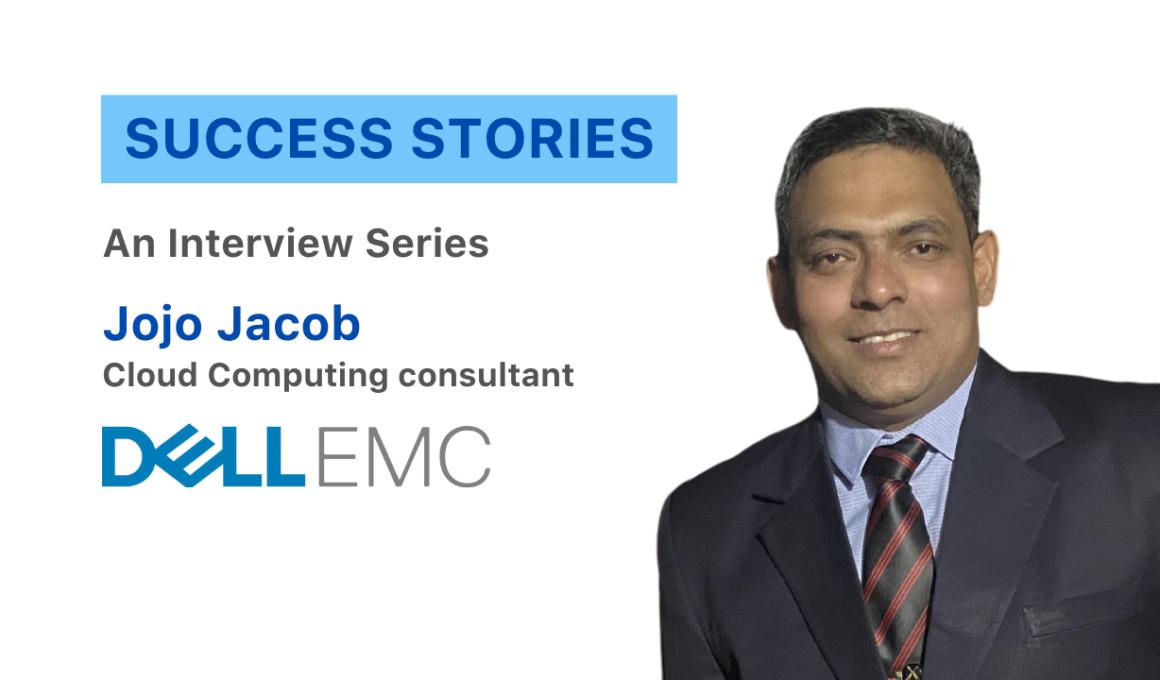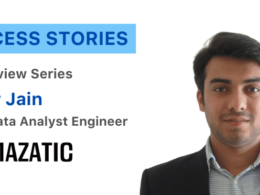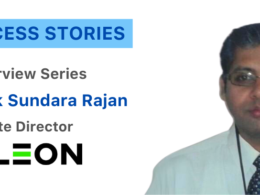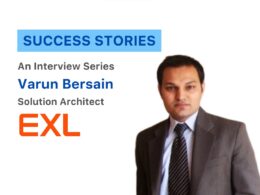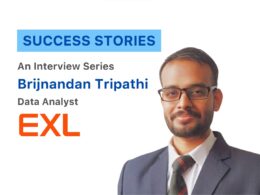In today’s Accredian Success Story, meet Lieutenant Colonel Jojo Jacob, who is a Cloud Computing consultant at Dell, and was a part of the PGP-DS & AI, 2020 batch at Accredian.
He shares his journey of achieving success and how he transitioned from the Army to working at Dell. Get to know more about him as he guides us through this amazing process.
Watch his interview right here
Q1. Tell us about your current role and background.
Jojo: Good morning to you, my name is Lieutenant Colonel Jojo Jacob, I’m a veteran of the Indian army, I served in the infantry of the Indian Army for 20 years post which I have transitioned into the corporate sector.
Currently, I’m working as a consultant and a migration leader in Dell Technologies based out of Bangalore. My background, as I said earlier, was from the army, but it was mostly non technical, I only had a very few exposure to technical or IT related stuff while serving in the army.
But when I was transitioning, I thought I should, you know, try to get a profession, which is close to my passion, which was being in the IT industry. So when I was transitioning, I decided to shift into cloud and AI based technologies, and did some training along with Accredian as well as some cloud certifications.
That enabled me to transition to the current role of consultant as well as a migration lead in Dell Technologies. I currently lead a team of people, which enable migration from on premises to cloud or virtual cloud to cloud data center migrations.
Q2. What challenges did you face while switching to Data Science?
Jojo: See, the biggest challenge was the lack of experience. My experience is mostly in combat roles.
So that does not serve anything in the current role, which I was doing except for the soft skills and leadership skills, otherwise, the biggest challenge was in spite of having knowledge and certification, people asked me for the experience of cutting across this or lack of it was a major problem.
Q3. How has Data Science helped you in your new role?
Jojo: I come from a domain where data is not very well utilized. Unfortunately, we are not yet there. So doing the data science course with Accredian has helped me understand the data better, which is available, decision making, which mostly we are intuitive in nature.
Due to the nature of the jobs you are doing, now, I’ve been able to make a switch over to data based or decision making jobs, which is a major switch over. Secondly, I tend to have a second look at any data which is presented to me, whether it is a graph, whether it is in tabular form, so you can gain better insights.
And you know, you start asking questions why and not to take what is presented to your interface, which I think is a major change again, and I’ve gained experience in using Python, to manipulate data and see the way I want to see it.
Q4. How do you plan to use your background skills in your new role?
Jojo: I was very passionate about the IT sector. That’s why I chose to be in the IT sector. And the other passion was environmental sustainability.
So what I’m hoping is to become an expert in combining these two areas, wherein you can implement artificial intelligence solutions in a cloud based environment to improve sustainability of our society and planet as a whole.
Q5. What was the interview experience at your current company?
Jojo: It was a very good experience. There were a few rounds of interviews. And thanks to all the learning I did, I was able to address the questions well, so I will say it when great.
The technical interview was the first round when they asked more about cloud technology and what I have learned. So basic components of cloud infrastructure of what difference it makes and various platforms which are used.
That doesn’t have such there were not many questions, because that was not the role I was being interviewed for. There were some questions from project management as well, and how I have used this experience, how I can link my previous experience to the current job.
So overall, the technical side went off well. And then there was a managerial interview, which was more related to soft skills and my experience in the army and how I can transition or transplant those experiences in the civil corporate domain. So I believe that also went well. That’s the feedback I got.
Q6. Why Accredian? How did it help you?
Jojo: That’s a very good question. Why Accredian, and I’ll take some time to answer it. When I was preparing to transition from Army to corporate or Civil, there were a lot of opportunities in front of me.
But whomsoever I contacted, they all started telling me you should know something about data.
So I started exploring what is data and data science and big data was a big word then two years back, but the world was very confusing, too much of answers and too many queries in whether you will open Quora or Google, or whichever search platform or whomever you ask, so it was very confusing.
So the biggest problem I found at that time was that the designs I was told about, involved a lot of mathematics, statistics and computer programming. Although I’m aware of these things, but I’m not proficient in them, I was not proficient in any of these things.
So how to, you know, come across these obstacles was a big issue, we are not using it professionally. And after the school days, we have not touched upon statistics in a big way, nor computer programs.
So I tried various options. One of them was the very famous pose by Andrew Ng in edX, that goes very well. But at that time listening to all the technical terms, costs, functions, thetas and betas, it actually put me off.
That is when I came across Accredian, because few of my friends or senior colleagues in the army were doing data science courses from Accredian. So when I approached Accredian, they had an open session or welcome session, which was there.
And few things which attracted me was the way the open session was conducted. It was very systematic, and the teaching style was good. So I thought this is how they conduct open sessions, probably the teaching side style is going to be better.
So I did some more research on Quora and other platforms, and I found a good review. Now, the second thing was the value for money. Wherever I checked, the data science courses were extremely highly priced.
But here we have a tier base pricing. And we could experiment. Since I was already put off by one post from Andrew Ng, the kind of complications that I was thinking why if you do the course, and then you invest a lot of money and you are not able to sustain, then there’s going to be a problem.
So the tier pricing of Accredian I found to be very useful. I initially only enrolled for data science, and later upgraded to AI and then completed postgraduate diploma and fellowship.
So these are the two things which mainly affected me in the initial stages. However, I would like to add that the LMS or the learning management system here is one of the best I’ve seen.
It’s not confusing, very, very precise and clear. And the teaching is excellent. Now the best way to learn everything about teaching, I would say, is that Accredian does not complicate mathematics and statistics.
It’s like the, you know, they’re made easy, it’s like storytelling, I would say. So it’s a reverse approach, you have a story first, instead of having the formulas first, which is the way generally it is taught in schools and colleges, you have a formula later.
And if you cannot understand the formula, you cannot understand anything else. But here, it’s the other way around, you’re taught like a story, a concept, and which concept develops into a formula or equation, or an algorithm.
So this helps people like us who have lost touch with the basics of math and statistics over a period of time to get back into the screen. So now I’m no more scared of any of these things, whether it is differentiation, or the complex formulas which are used in AI and machine language.
That is one of the fortes and I hope it remains like that. Another thing is the thoroughness of teaching, importance given to theory and understanding theory, as well as the code, the significance of it, and the industry related examples which are taken, I think this goes a long way.
The projects are good and challenging. And of course, there seems to be no rush to meet the timelines like, you know, you have to finish within this particular period. For whatever reason we have missed the class or two, let’s catch up.
Well, that does not happen here. I found that you know, whether it takes extra time to do it, that features ensure that the doubts are cleared, and the subject is very, very well covered. So thank you.
Q7. What advice would you give to Data Science beginners?
Jojo: I’m still a beginner, I cannot say I became an expert by doing the course. But still, with whatever experience of learning I’ve had, which I’m continuing to have, I’ll say that I think we all need to learn the basics.
We cannot skip the basics, we need to brush up on our statistics, differentiation and integration skills. And basic mathematics. This is very, very important. Without that you cannot, you know, think of going ahead.
Then have a plan, how to implement it in whichever domain you’re working. Not that dozens can implement that anywhere, whether it is the financial sector or healthcare or wherever.
So learning it as a whole, knowing where and how you’re going to implement it gives you a more streamlined approach to learning Data Science and basics plus, you can clear your doubts and how things are in the new domain when you approach these algorithms or whatever we are learning.
Next is you have to read a lot, you have to subscribe to forums like Medium or Towards Data Science and various other forums and books. So, you cannot say that I’m just doing a course from Accredian or any other place, and just leave it at that.
That will not help you because things in data science, AI and ML as an area experience a lot of changes frequently, where it is being updated and upgraded. So unless you can cope with that, you will be left behind again. So understanding theory, that is very, very important.
Code lines, comparatively, it’s very easy. Learning Python is very easy compared to learning theory.
Knowing just how to do it is not enough, why we are doing it and what goals are behind why we come to this particular algorithm and why are we coming to this particular conclusion based on the data or the results which we are seeing that I think holds more importance than just writing a few lines of code.
So as a user of data science, I think you have to have a thorough grip on the theory part. So that I believe is what I can tell now from my experience to any other new beginners or those who are starting with the data science journey.
So I’d like to thank the entire team and instructors, and the support staff at Accredian for the wonderful journey which I still continue to have. I’m still learning and I hope to make good use of all the learning. Thank you so much.
We hope you found this success story interesting. If you have any Product Management questions, please fill this form and we will get back to you.

